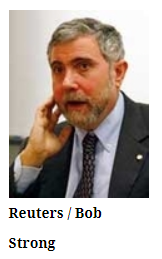Increasingly, researchers are debating issues on the Internet, through blogs and other forums, rather than just in journals and at conferences. Each issue of The Broker will now include an ‘Online debate’ section, which provides summaries of expert commentaries and discussions on a particular topic from across the web – beginning with this issue’s look at what economists are saying about the financial crisis.
Why did no one see the current financial crisis coming? Even Britain’s Queen Elizabeth II has publicly asked this question about the crisis and the global recession that has followed. At the opening of a new London School of Economics (LSE) building in November 2008, she quizzed economics professor Luis Garicano on the origins of the credit crunch and the failure of the economics profession to provide any warnings.
Many within the profession are also debating this fundamental question, as well as the immediate and longer-term challenges for policy making. What can be done to restore the financial sector to health, return the world economy to sustainable growth and to limit the fallout of the crisis on the poorest countries? How we can avoid such a disaster in the future? Much of this debate is conducted in the ‘blogosphere’.
How bad will it get?

Ten years ago, Nobel laureate Paul Krugman published a book called The Return of Depression Economics. He focused on two economic disasters of the 1990s: the lost decade of economic growth in Japan and the wave of currency crises and severe recessions, from Britain and Sweden in the early part of the decade to East Asia, Russia and Brazil in the closing years of the 20th century.
With the financial crisis that began in August 2007 and worsened dramatically in autumn 2008, many now fear a downturn comparable to the Great Depression of the 1930s. As long ago as October, Krugman predicted an ‘economic slump that will be nasty, brutish – and long’. His blog, newly revised book and twice-weekly column in the New York Times are equally gloomy, but they are essential reading on the crisis.
Another ‘must-read’ website is Vox, a portal run by the Centre for Economic Policy Research (CEPR), UK, which offers ‘research-based policy analysis and commentary from leading economists’ (full disclosure: I am on the Vox editorial board). Its most popular column to date by far – over 100,000 views since being posted in early April – states that the world economy is now doing worse than during the Great Depression.

LSE professor and former UK monetary policy maker Willem Buiter – who posts on both Vox and a blog hosted by the Financial Times – is also pessimistic. The self-styled Maverecon sees ‘green shoots’ of recovery only in China, and even there it is unlikely to be sustainable given the country’s dependency on exports. He also worries about the potential economic consequences of a global flu epidemic.
But there is no ‘house view’ at Vox. For example, Nick Bloom of Stanford University, who predicted last June that rising uncertainty would lead to firms postponing investment and hiring decisions and consequently a slowdown, now reports a decline in uncertainty, which suggests that we are ‘halfway to recovery’. Robert Gordon of Northwestern University is also optimistic, forecasting that the trough of the US recession will be in May or June.
What should be done?
The starting point for current debate is the International Monetary Fund’s (IMF) World Economic Outlook. Most agree with its warnings that ‘a slide toward trade and financial protectionism would be hugely damaging to all, a clear warning from the experience of 1930s beggar-thy-neighbor policies’, and that what is needed is ‘stepping up efforts to heal the financial sector, while continuing to support demand with monetary and fiscal easing’.
There is less consensus over what kinds of macroeconomic policy are going to be most effective. Where do central banks go when interest rates approach zero? Do tax cuts or increased spending provide greater fiscal stimulus? And are there longer-term threats of inflation and unsustainable public finances? A widely read blog on these macroeconomic debates is that of Harvard professor and former adviser to President Bush, Greg Mankiw.

The IMF report describes what most agree is vital when addressing the financial sector,: ‘(1) ensuring that financial institutions have access to liquidity, (2) identifying and dealing with distressed assets, and (3) recapitalizing weak but viable institutions’. More broadly, even University of Chicago professor and long-time blogger Richard Posner says that ‘it will be necessary to improve and extend the oversight and regulation of the financial system’.
President Obama’s chief of staff Rahm Emanuel claims ‘you never want a serious crisis to go to waste’, and one aspect of the opportunities he sees might be the chance to make big changes in financial regulation. The Economist’s Free Exchange blog features detailed discussions of this point by some of the most popular economics bloggers: Vox editor in chief Richard Baldwin, Brad DeLong, Mark Thoma, Simon Johnson and Dani Rodrik.
Some economists have fundamental concerns about finance. Krugman is deeply sceptical about the Obama administration’s bank bailout plan. And former IMF chief economist Simon Johnson argues that the finance industry has effectively captured the US government and is blocking reform, saying ‘we face … a political balance of power that gives the financial sector a veto over public policy, even as that sector loses popular support’.
Future of the economics profession
Some economic journalists have been scathing about what they see as the failure of economics. Peter Coy, economics editor of BusinessWeek, wrote a recent cover story asking ‘what good are economists anyway’? And Anatole Kaletsky, former economics editor of the The Times, says, ‘not only have economists, as a profession, failed to guide the world out of the crisis, they were also primarily responsible for leading us into it’.
How economists react to this criticism? University of Warwick professor Andrew Oswald thinks that ‘Kaletsky is almost completely right to say that academic economists take a slice of the blame’. But he also notes that some of Kaletsky’s specific criticisms, such as the use of mathematics, are misguided, saying ‘If Britain’s bridges fell down, we would not instruct engineers to stop using mathematics’.
Andrew Scott of London Business School is even more dismissive of Kaletsky, and claims ‘He is just wrong on every point of detail. Of course this whole episode will change the research agenda in macro but he ignores so much recent research’. And Oswald’s Warwick colleague Mark Harrison says ‘economists have plenty to reflect on. But perhaps he should reserve a little of his anger for his own poor judgement in deciding which economists to listen to’.
Andrew Oswald believes ‘it will be necessary to rewrite standard economics’. But Barry Eichengreen, Berkeley professor and co-author of the Vox column on the similarities with the Great Depression, argues that the problem is more one of application. In a powerful article in The National Interest, he explains how it was that the vast majority of economists remained silent and indeed unaware of the risk of financial disaster. He writes
‘What got us into this mess … was not the failure or inability of economists to model conflicts of interest, incentives to take excessive risk and information problems that can give rise to bubbles, panics and crises … It was not that economists failed to recognize the role of social and psychological factors in decision-making … Rather, the problem was a partial and blinkered reading of that literature’.
Willem Buiter is also critical of the economists to whom policy makers turned, saying ‘The Bank of England in 2007 faced the onset of the credit crunch with too much Robert Lucas, Michael Woodford and Robert Merton in its intellectual cupboard. A drastic but chaotic re-education took place and is continuing. I believe that the Bank has by now shed the conventional wisdom of the typical macroeconomics training of the past few decades’.
So what will replace the conventional wisdom? The arguments within economics continue – on the ‘global crisis debate’ pages of Vox, where readers of The Broker can contribute, and across the blogosphere. There is certainly a new humility in the profession. As John Maynard Keynes, now back in fashion, said, ‘if economists could manage to get themselves thought of as humble, competent people on a level with dentists, that would be splendid’.
Meanwhile, Barry Eichengreen sees ‘a quiet revolution in the practice of economics’. He concludes that ‘the twenty-first century will be the age of inductive economics, when empiricists hold sway and advice is grounded in concrete observation of markets and their inhabitants. Work in economics, including the abstract model building in which theorists engage, will be guided more powerfully by this real-world observation. It is about time’.
Footnotes
- www.guardian.co.uk
- Two rankings of top economics blogs: www.econolog.net; www.gongol.com.
- www.krugmanonline.com
- krugman.blogs.nytimes.com
- www.voxeu.eu
- www.voxeu.eu
- blogs.ft.com/maverecon
- blogs.ft.com/maverecon
- www.voxeu.eu
- www.voxeu.eu
- www.voxeu.eu
- www.imf.org
- gregmankiw.blogspot.com
- His latest book is reviewed here by Nobel laureate Robert Solow: www.nybooks.com; and his blog with another laureate Gary Becker is here: www.becker-posner-blog.com.
- www.economist.com/blogs/freeexchange/rodrik_roundtable; www.economist.com/blogs/freeexchange/rajan_roundtable
- delong.typepad.com
- economistsview.typepad.com/economistsview
- baselinescenario.com
- rodrik.typepad.com
- www.newsweek.com
- www.theatlantic.com
- www.businessweek.com
- www.prospect-magazine.co.uk
- www.prospect-magazine.co.uk
- blog.prospectblogs.com; blogs.warwick.ac.uk
- www.andrewoswald.com
- www.nationalinterest.org
- blogs.ft.com/maverecon
- www.voxeu.org
